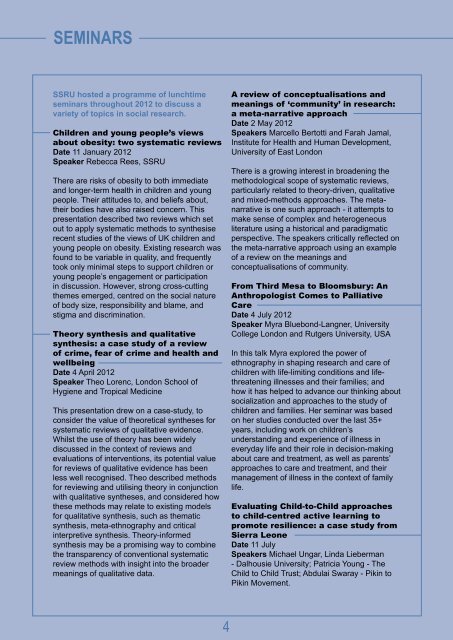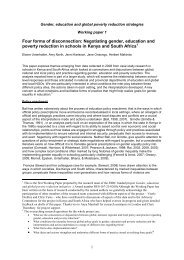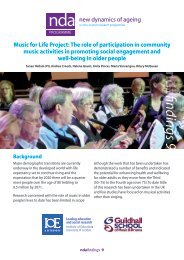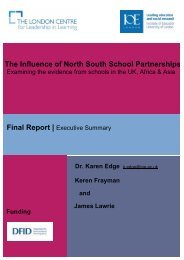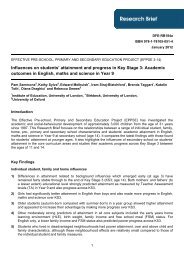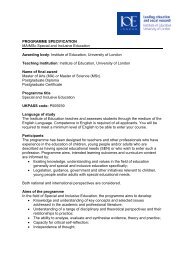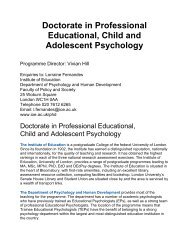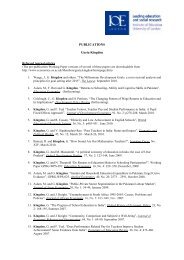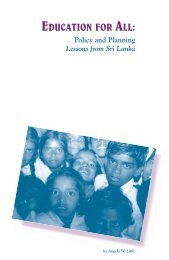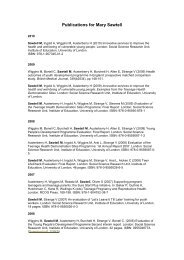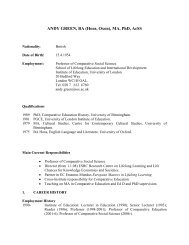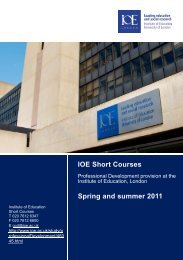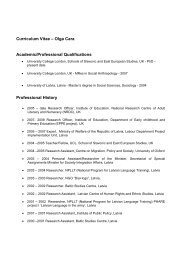Annual Report 2012 (pdf) - Institute of Education, University of London
Annual Report 2012 (pdf) - Institute of Education, University of London
Annual Report 2012 (pdf) - Institute of Education, University of London
You also want an ePaper? Increase the reach of your titles
YUMPU automatically turns print PDFs into web optimized ePapers that Google loves.
SEMINARS<br />
SSRU hosted a programme <strong>of</strong> lunchtime<br />
seminars throughout <strong>2012</strong> to discuss a<br />
variety <strong>of</strong> topics in social research.<br />
Children and young people’s views<br />
about obesity: two systematic reviews<br />
Date 11 January <strong>2012</strong><br />
Speaker Rebecca Rees, SSRU<br />
There are risks <strong>of</strong> obesity to both immediate<br />
and longer-term health in children and young<br />
people. Their attitudes to, and beliefs about,<br />
their bodies have also raised concern. This<br />
presentation described two reviews which set<br />
out to apply systematic methods to synthesise<br />
recent studies <strong>of</strong> the views <strong>of</strong> UK children and<br />
young people on obesity. Existing research was<br />
found to be variable in quality, and frequently<br />
took only minimal steps to support children or<br />
young people’s engagement or participation<br />
in discussion. However, strong cross-cutting<br />
themes emerged, centred on the social nature<br />
<strong>of</strong> body size, responsibility and blame, and<br />
stigma and discrimination.<br />
Theory synthesis and qualitative<br />
synthesis: a case study <strong>of</strong> a review<br />
<strong>of</strong> crime, fear <strong>of</strong> crime and health and<br />
wellbeing<br />
Date 4 April <strong>2012</strong><br />
Speaker Theo Lorenc, <strong>London</strong> School <strong>of</strong><br />
Hygiene and Tropical Medicine<br />
This presentation drew on a case-study, to<br />
consider the value <strong>of</strong> theoretical syntheses for<br />
systematic reviews <strong>of</strong> qualitative evidence.<br />
Whilst the use <strong>of</strong> theory has been widely<br />
discussed in the context <strong>of</strong> reviews and<br />
evaluations <strong>of</strong> interventions, its potential value<br />
for reviews <strong>of</strong> qualitative evidence has been<br />
less well recognised. Theo described methods<br />
for reviewing and utilising theory in conjunction<br />
with qualitative syntheses, and considered how<br />
these methods may relate to existing models<br />
for qualitative synthesis, such as thematic<br />
synthesis, meta-ethnography and critical<br />
interpretive synthesis. Theory-informed<br />
synthesis may be a promising way to combine<br />
the transparency <strong>of</strong> conventional systematic<br />
review methods with insight into the broader<br />
meanings <strong>of</strong> qualitative data.<br />
A review <strong>of</strong> conceptualisations and<br />
meanings <strong>of</strong> ‘community’ in research:<br />
a meta-narrative approach<br />
Date 2 May <strong>2012</strong><br />
Speakers Marcello Bertotti and Farah Jamal,<br />
<strong>Institute</strong> for Health and Human Development,<br />
<strong>University</strong> <strong>of</strong> East <strong>London</strong><br />
There is a growing interest in broadening the<br />
methodological scope <strong>of</strong> systematic reviews,<br />
particularly related to theory-driven, qualitative<br />
and mixed-methods approaches. The metanarrative<br />
is one such approach - it attempts to<br />
make sense <strong>of</strong> complex and heterogeneous<br />
literature using a historical and paradigmatic<br />
perspective. The speakers critically reflected on<br />
the meta-narrative approach using an example<br />
<strong>of</strong> a review on the meanings and<br />
conceptualisations <strong>of</strong> community.<br />
From Third Mesa to Bloomsbury: An<br />
Anthropologist Comes to Palliative<br />
Care<br />
Date 4 July <strong>2012</strong><br />
Speaker Myra Bluebond-Langner, <strong>University</strong><br />
College <strong>London</strong> and Rutgers <strong>University</strong>, USA<br />
In this talk Myra explored the power <strong>of</strong><br />
ethnography in shaping research and care <strong>of</strong><br />
children with life-limiting conditions and lifethreatening<br />
illnesses and their families; and<br />
how it has helped to advance our thinking about<br />
socialization and approaches to the study <strong>of</strong><br />
children and families. Her seminar was based<br />
on her studies conducted over the last 35+<br />
years, including work on children’s<br />
understanding and experience <strong>of</strong> illness in<br />
everyday life and their role in decision-making<br />
about care and treatment, as well as parents’<br />
approaches to care and treatment, and their<br />
management <strong>of</strong> illness in the context <strong>of</strong> family<br />
life.<br />
Evaluating Child-to-Child approaches<br />
to child-centred active learning to<br />
promote resilience: a case study from<br />
Sierra Leone<br />
Date 11 July<br />
Speakers Michael Ungar, Linda Lieberman<br />
- Dalhousie <strong>University</strong>; Patricia Young - The<br />
Child to Child Trust; Abdulai Swaray - Pikin to<br />
Pikin Movement.<br />
4<br />
4


